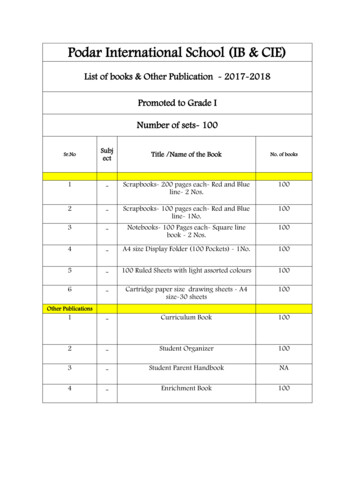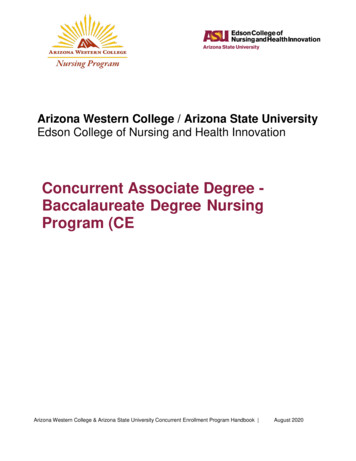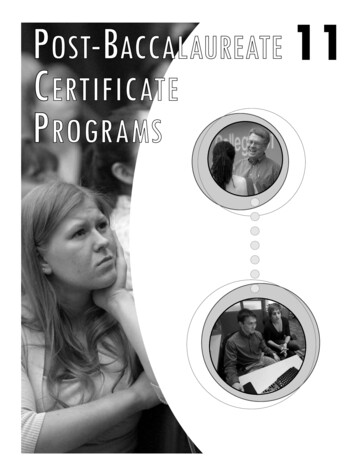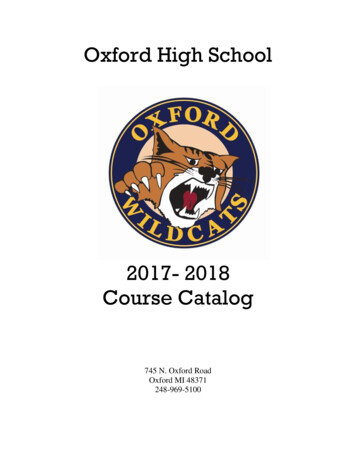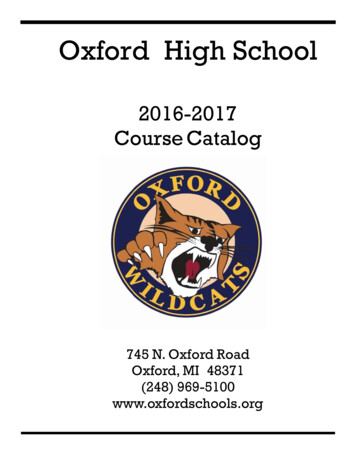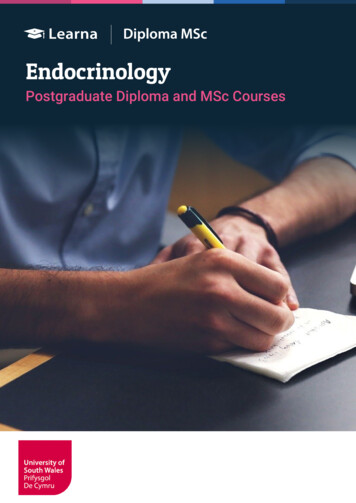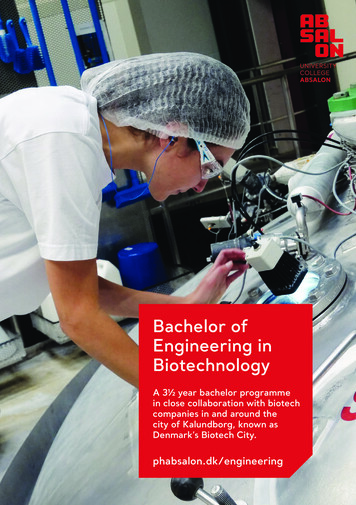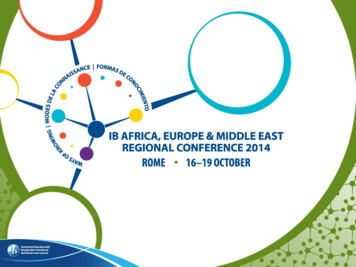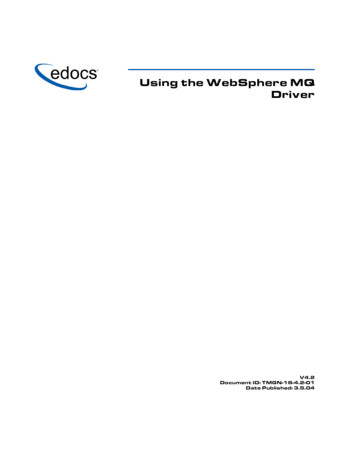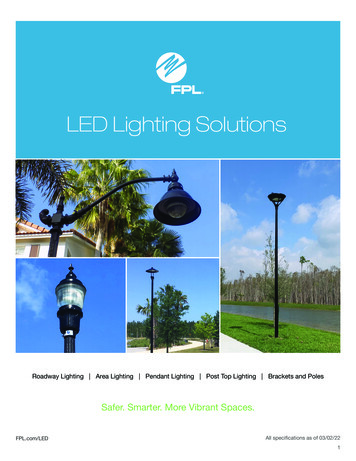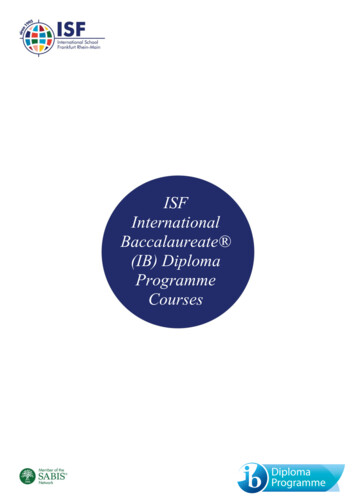
Transcription
ISFInternationalBaccalaureate (IB) DiplomaProgrammeCoursesPage 1
Group 1Studies in Language and Literature:English, German, Korean, JapaneseGroup up 3Individualsand Societies:EconomicsGeographyHistoryGroup 4Sciences:BiologyChemistryPhysicsGroup 5Mathematics:MathsMaths StudiesGroup 6The Arts / Electives*:Music, Visual Arts / Computer Science*,Another subject from Groups 1-4*Basic requirements Six subjects studied concurrentlyOne subject from each of the six groupsThree taken at higher level (HL)Three taken at standard level (SL)Minimum score of 24 pointsCreativity, Activity, Service ; ExtendedEssay and Theory of KnowledgePage 2Additional requirements for study inGermany First language: Literature or Language and LiteratureSecond language: minimum Language B at HL oranother language from Group 1One of the HL subjects must be Mathematics or aGroup 4 Science
Table of ContentsPageIntroduction4Group 1: Studies in Languageand Literature5PageChemistry SLPhysics HLPhysics SL283030Group 5: Mathematics33Mathematics HLMathematics SLMathematical Studies SL333334Group 6: The Arts and Electives*35Music HLMusic SLVisual Arts HLVisual Arts SLComputer Science HL*Computer Science SL*353536373839English Literature HLEnglish Literature SLEnglish Language & Literature HLEnglish Language & Literature SLGerman Literature HLGerman Literature SLGerman Language & Literature HLGerman Language & Literature SLKorean Literature HLKorean Literature SLJapanese Literature HLJapanese Literature SLSelf-Taught Literature SL55556677889910Group 2: Language Acquisition11Diploma Programme Core40English Language B HLEnglish Language B SLGerman Language B HLGerman Language B SLFrench Language B HLFrench Language B SLSpanish Language B HLSpanish Language B SLGerman ab initio SLFrench ab initio SLSpanish ab initio SL1112121516171819212223Creativity, Activity, Service (CAS)The Extended Essay (EE)Theory of Knowledge (TOK)404141Admission to Universities43German Foreign LanguageExaminations at ISF44Group 3: Individuals andSocieties24Economics HLEconomics SLHistory HLHistory SLGeography HLGeography SL242425252525Group 4: Sciences27Biology HLBiology SLChemistry HL272728Page 3
IntroductionThe International Baccalaureate Diploma Programme is administrated by theInternational Baccalaureate Organization, based in Geneva, Switzerland. The IBDiploma programme is a two-year programme and usually begins in the eleventhgrade, continuing through the end of the twelfth grade. The IB Diploma is aninternationally recognized University qualification in the USA. Students pursuing the IBcourses have the possibility to earn college credit in selected subjects depending uponuniversities’ policies.IB courses are given final, cumulative scores on a scale of 0-7. Scores are the sum ofall internal and external assessments; the percentage of weight given to eachcomponent of a course depends on each subject. Internal assessments will count foranywhere from 20% to 30% of a final subject score.Diploma candidates must earn a minimum score of 24 points for six courses in order toearn the IB Diploma. IB Diploma candidates must take at least three Higher Level (HL)courses and no more than three Standard Level (SL) courses. If a student pursuesthree HL courses, the total for those three must equal 12 with no one subject scorebelow 3. Final scores for IB courses are provided by International Baccalaureate Curriculum and Assessment Centre (IBCA) via website in early July after the relevantcourses have been completed. Official university transcripts for IB coursework must beobtained via email from IBO directly.All students taking IB level classes will need to complete all IBO assessments relevantto each course. The students enrolled in the International Baccalaureate DiplomaProgramme study five-core IB subject areas (language and literature, languageacquisition, individuals and societies, sciences, mathematics) for two years. Studentsmust choose an additional sixth subject either from the offered core subjects or fromgroup 6 and must study the Theory of Knowledge (TOK) course, complete anExtended Essay, and document the required CAS projects. Minimum passing scores inTheory of Knowledge assessments and on the externally assessed Extended Essayare required for the Diploma. Additionally, all students must fulfil seven CAS outcomesthrough involvement in a number of projects to be completed under the threecategories of Creativity, Activity & Service. These projects must be appropriatelydocumented and filed at the school. Successful candidates may earn the IB Diploma inaddition to the ISF High School Diploma. Students who demonstrate above-averagework on Theory of Knowledge assessments and with their Extended Essays may earnup to 3 bonus points toward the IB Diploma.The distinction between Higher Level and Standard Level courses deals primarily withthe depth of content for which the student is responsible. HL courses are covered inmore periods per week. HL courses typically have more assessments associated withthem when compared to SL courses, and HL assessments tend to be more rigorous.Each year, schools provide IBCA with Predicted Grades. The purpose of PredictedGrades is to provide IBCA with a system of checks and balances to ensure thatexaminer and moderator scores are consistent.Page 4
Course DescriptionsGroup 1: Studies in Language and LiteratureCourse: English Literature HL / SLCourse DescriptionThis is an IB, Group 1 course offered at both Higher and Standard Levels. It isdesigned for students who have English as their mother-tongue or native speakerability. The syllabus consists of works chosen from an IB prescribed list of authors(PLA), an IB prescribed literature in translation list (PLT), and works chosen freely bythe school. The study of these works is divided into four parts, each having a particularfocus: Part 1: Works in Translation Part 2: Detailed Study Part 3: Literary Genres Part 4: OptionsStudents are required to read 10 works at the Standard Level and 13 at Higher Level.AssessmentAssessment occurs both internally (externally moderated) and externally and consistsof: A written literary analysis on a Part 1 work (1,200 – 1,500 words) with areflective statement for each work in translation from Part 1 (300 – 400 words)and supervised writing for each work in translation from Part 125% an individual oral commentary on a Part 2 work15% an individual oral presentation on a Part 4 work15%Exams Paper 1: Essay on an unseen passage20% Paper 2: Comparative analysis of at least 2 works from Part 325%Course: English Language & Literature HL / SLCourse DescriptionThis is an IB, Group 1 course offered at both Higher and Standard Levels. Thelanguage & literature course comprises four parts – two relate to the study of languageand two to the study of literature. Students who take this course have varied languageprofiles and may be multilingual. The syllabus consists of works chosen from an IBprescribed list of authors (PLA), an IB prescribed literature in translation list (PLT), andtexts chosen from a variety of sources, genres and media by the school.The four parts are: Parts 1 & 2: Language and Culture Context,Language and Mass Communication Part 3:Literature – Texts and Contexts Part 4:Literature – Critical AnalysisPage 5
Students are required to read 4 works of literature at the Standard Level and 6 atHigher Level.AssessmentAssessment occurs both internally (externally moderated) and externally and consistsof: Written Tasks (each task between 800 – 1,000 words plus a rationalebetween 200 – 300 words). 4 at HL, 3 at SL20% Individual Oral Commentary - based on the texts studied in part 4:Literature – Critical Analysis15% Further Oral Activity (2 oral activities, one based on Part 1and one on Part 2)15%Exams Paper 1 – Comparative Textual Analysis at HL (Analysis of one text at SL) 25% Paper 2 – Essay based on the texts studied in part 3:Literature – Texts and Contexts25%Course: German Literature HL / SLCourse DescriptionThis is an IB, Group 1 course offered at both Higher and Standard Levels. It isdesigned for students who have German as their mother-tongue or native speakerability. The syllabus consists of works chosen from an IB prescribed list of authors(PLA), an IB prescribed literature in translation list (PLT), and works chosen freely bythe school. The study of these works is divided into four parts, each having a particularfocus: Part 1: Works in Translation Part 2: Detailed Study Part 3: Literary Genres Part 4: OptionsStudents are required to read 10 works at the standard level and 13 at higher level.AssessmentAssessment occurs both internally (externally moderated) and externally and consistsof: a written literary analysis on a Part 1 work (1,200 – 1,500 words) with areflective statement for each work in translation from Part 1 (300 – 400 words)and supervised writing for each work in translation from Part 125% an individual oral commentary on a Part 2 work15% an individual oral presentation on a Part 4 work15%Exams Paper 1: Essay on an unseen passage20% Paper 2: Comparative analysis of at least 2 works from Part 325%Page 6
Course: German Language & Literature HL / SLCourse DescriptionThis is an IB, Group 1 course offered at both Higher and Standard Levels. Thelanguage & literature course comprises four parts – two relate to the study of languageand two to the study of literature. Students who take this course have varied languageprofiles and may be multilingual. The syllabus consists of works chosen from an IBprescribed list of authors (PLA), an IB prescribed literature in translation list (PLT), andtexts chosen from a variety of sources, genres and media by the school.The four parts are; Parts 1 & 2: Language and Culture Context,Language and Mass Communication Part 3:Literature – Texts and Contexts Part 4:Literature – Critical AnalysisStudents are required to read 4 works of literature at the standard level and 6 at higherlevel.AssessmentAssessment occurs both internally (externally moderated) and externally and consistsof: Written Tasks (each task between 800 – 1,000 words plus a rationalebetween 200 – 300 words). 4 at HL, 3 at SL20% Individual Oral Commentary - based on the texts studied in part 4:Literature – Critical Analysis15% Further Oral Activity (2 oral activities, one based on Part 1and one on Part 2)15%Exams Paper 1 – Comparative Textual Analysis at HL (Analysis of one text at SL) 25% Paper 2 – Essay based on the texts studied in Part 3:Literature – Texts and Contexts25%Page 7
Course: Korean Literature HLCourse DescriptionIn a two-year course, students learn to analyze, criticize and write about masterpiecesof Korean and works in translation. Students’ skills in oral and written communicationare developed through the study of selected novels, plays, poems and short storiesfrom different periods, genres and styles. The course aims to promote a lifelongappreciation and enjoyment of literature.TopicsThe course will be divided into the four assessment parts described below:TermIB ActivityYear 1 Term OneAssessmentPartsPart 4Year 1 Term TwoPart 2Practice oral commentaryYear 1 Term ThreePart 1Introduce Works in translationYear 2 Term OnePart 1Part 3Year 2 Term TwoPart 3Year 2 Term ThreePart 3Complete Works in translationExamination Text 1,Final oral commentary (Part 2)Examination Texts 2 and 3,Mock examinationsExamination Text 4, Revision,Final examinationsIndividual oral presentation (Part 4)Assessment Part 1 (25%): Study of three works in translation, assessed by one writtenassignment with a reflective statement marked externally:a. reflective statement: 300 – 400 wordsb. essay: 1200 – 1500 words Part 2 (15%): Detailed study of three texts assessed by internal formal oral andcommentary assignments and externally moderated Part 3 (45%): A thematic study of four texts assessed by two external writtenexaminations Part 4 (15%): A study of three texts linked by genre, theme or period, providingthe basis for a variety of internal oral courseworkCourse: Korean Literature SLCourse DescriptionIn a two-year course, students learn to analyze, criticize and write about masterpiecesof Korean and works in translation. Students’ skills in oral and written communicationare developed through the study of selected novels, plays, poems and short storiesfrom different periods, genres and styles. The course aims to promote a lifelongappreciation and enjoyment of literature.Page 8
TopicsThe course will be divided into the four assessment parts described below:TermIB ActivityYear 1 Term OneAssessmentpartsPart 4Year 1 Term TwoPart 2Practice oral commentaryYear 1 Term ThreePart 1Introduce Works in translationYear 2 Term OnePart 1Part 3Year 2 Term TwoPart 3Year 2 Term ThreePart 3Complete Works in translationExamination Text 1,Final oral commentary (Part 2)Examination Texts 2 and 3,Mock examinationsExamination Text 4, Revision,Final examinationsIndividual oral presentation (Part 4)Assessment Part 1 (25%): Study of two works in translation, assessed by one writtenassignment with a reflective statement marked externally:a. reflective statement: 300 – 400 wordsb. essay: 1200 – 1500 words Part 2 (15%): Detailed study of two texts assessed by internal formal oral andcommentary assignments and externally moderated Part 3 (45%): A thematic study of three texts assessed by two external writtenexaminations Part 4 (15%): A study of three texts linked by genre, theme or period, providingthe basis for a variety of internal oral courseworkCourse: Japanese Literature HL / SLCourse DescriptionThis is a two-year course offered at both Higher and Standard Levels. It is designed forstudents who have Japanese as their mother-tongue or native speaker ability. Thesyllabus consists of works chosen from an IB prescribed list of authors (PLA), an IBprescribed literature in translation list (PLT), and works chosen freely by the school.The study of these works is divided into four parts, each having a particular focus: Part 1: Works in Translation Part 2: Detailed Study Part 3: Literary Genres Part 4: OptionsStudents are required to read 10 works at the Standard Level and 13 at Higher Level.The works are selected from different genres, periods and styles. Through a thoroughanalysis of texts, students are expected to acquire skills in critical reading, culturalunderstanding and appreciation of literature, as well as effective oral and writtencommunication skills.Page 9
AssessmentAssessment occurs both internally (externally moderated) and externally and consistsof: a reflective statement for each work in translation from Part 1 (600 - 800 words) supervised writing for each work in translation from Part 1 a written literary analysis on a Part 1 work (2,400 - 3,000 words) an individual oral commentary on a Part 2 work an individual oral presentation on a Part 4 work Paper 1: Essay on an unseen passage Paper 2: Comparative analysis of at least 2 works from Part 3Course: School Supported Self-taught (Literature only) SLCourse DescriptionSelf-taught students may study literature at the standard level only. They are expectedto meet the same syllabus requirements for SL students with the exception that Part 4is not a free choice. Students (school guided) must choose three works from the PLA.The same works must be selected by all students in that section regardless oflanguage.AssessmentAssessment for self-taught students is all external and there is no interactive oral as inthe English Literature course. In lieu of this the students are required to keep a writingjournal for both the works in translation studied in Part 1 of the course. The studentswrite their personal response to the following questions: In what way do time and place matter to this work? What was easy to understand and what was difficult in relation to social andcultural context and issues? What connections did you find between issues in the work and your ownculture(s) and experience? What aspects of technique are interesting in the work?A second difference between English literature assessment and the self-taught courseis the alternative oral examination. Self-taught students prepare for their oralexamination using guiding questions supplied by IB and then choose extracts, with theguidance from their tutor and self-taught teacher.Page 10
Group 2: Language AcquisitionCourse: English Language B HL / SLCourse DescriptionLanguage B is a two year language acquisition course for students with somebackground in the target language. While acquiring the language, students will explorethe culture(s) connected to it. Students study a core curriculum plus options in additionto two literary works to build the necessary skills to reach the assessment objectives ofthe course. Listening, speaking, reading and writing skills will be developed throughanalysis of moderately complex written and spoken material.English Language B - HLThe course comprises five topics: three core topics and two optional topics. At leasttwo aspects must be covered in each of the five topics that make up the course.Additionally, at HL students must read two works of literature.Topics1. The core is divided into three areas and is a required area of study: Communication and media Global issues Social relationships2. In addition teachers select from two of the following five options: Cultural diversity Customs and traditions Health Leisure Science and TechnologyAssessmentExternal Assessment Paper 1 (1 hour 30 minutes): Receptive skillsText-handling exercises on five written texts, based on the core. Paper 2 (1 hour 30 minutes): Written productive skillsTwo compulsory writing exercises:Section A: One task of 250 – 400 words, based on the options, to beselected from a choice of five.Section B: Response of 150 – 250 words to a stimulus text, based onthe core. Written assignment: Receptive and written productive skillsCreative writing of 500 – 600 words plus a 150 – 250 word rationale,based on one or two of the literary texts read.Internal Assessment(Internally assessed by the teacher and externally moderated by the IB) Individual oral (8–10 minutes)Based on the options: 15 minutes’ preparation time and a 10 minute(max.) presentation and discussion with the teacher. Interactive oral activityBased on the core: Three classroom activities assessed by the teacher.Page 1170%25%25%20%30%20%10%
English Language B - SLThe course comprises five topics: three core topics and two optional topics. At leasttwo aspects must be covered in each of the five topics that make up the course. Unlikehigher level, this course does not require students to study any works of literature.Topics1. The core is divided into three areas and is a required area of study: Communication and media Global issues Social relationships2. In addition teachers select from two of the following five options: Cultural diversity Customs and traditions Health Leisure Science and TechnologyAssessmentExternal Assessment Paper 1 (1 hour 30 minutes): Receptive skillsText-handling exercises on four written texts, based on the core. Paper 2 (1 hour 30 minutes): Written productive skillsOne writing exercise of 250 – 400 words from a choice of five,based on the options. Written assignment: Receptive and written productive skillsInter-textual reading followed by a written task of 300 – 400 words plus a150 – 200 word rationale, based on the core.70%25%25%20%Internal Assessment30%(Internally assessed by the teacher and externally moderated by the IB) Individual oral (8–10 minutes)Based on the options: 15 minutes preparation time and a 10 minute (max.)presentation and discussion with the teacher.20% Interactive oral activityBased on the core: Three classroom activities assessed by the teacher. 10%Course: German Language B HL / SLCourse DescriptionGerman Language B is a language acquisition course developed at two levels—Standard Level (SL) and Higher Level (HL) — for students with some background inthe target language. While acquiring a language, students will explore the culture(s)connected to it. The focus of these courses is language acquisition and interculturalunderstanding.The language B syllabus approaches the learning of language through meaning.Through the study of the core and the options at SL and HL, plus at least two literaryworks at HL, students build the necessary skills to reach the assessment objectives ofPage 12
the Language B course through the expansion of their receptive, productive andinteractive skills.SL and HL are differentiated by the recommended number of teaching hours, the depthof syllabus coverage, the study of literature at HL, the nature of the written assignment,and the level of difficulty and demands of assessment and assessment criteria.German Language B - HLThe course comprises five topics: three core topics and two optional topics. At leasttwo aspects must be covered in each of the five topics that make up the course.Additionally, at HL students must read two works of literature.Topics in Year ICommunication and mediaAspects include: Advertising Bias in media Censorship Internet Mail Press Radio and television Sensationalism in media TelephoneGlobal issuesAspects include: Drugs Energy reserves Food and water Global warming, climate change, natural disasters Globalization International economy Migration (rural–urban, or international) Poverty and famine Racism, prejudice, discrimination The effect of man on nature The environment and sustainability.Social relationshipsAspects include: Celebrations, social and religious events Educational system Language and cultural identity, or self-identity Minorities Multilingualism Nationalism, patriotism, fanaticism Relationships (friendship, work, family) Social and/or political structures Social behaviors and stances Taboos versus what is socially acceptablePage 13
Works of LiteratureThomas Brussig: Am kürzeren Ende der Sonnenallee (Fischer)Gudrun Pausewang: Die Wolke (Ravensburger)Topics in Year IIHealthAspects include: Concepts of beauty and health Diet and nutrition Drug abuse Health services Illnesses, symptoms of good/ill health Physical exercise Surgery Traditional and alternative medicineLeisureAspects include: Entertainment Exhibitions and shows Games Hobbies Recreation Social interaction through leisure Sports TravellingWork of Literature: Friedrich Dürrenmatt: Der Besuch der alten Dame (Diogenes)AssessmentExternal Assessment70% Paper 1 (1 hour 30 minutes): Receptive skills25%Text-handling exercises on five written texts, based on the core. Paper 2 (1 hour 30 minutes): Written productive skills25%Two compulsory writing exercises.Section A: One task of 250 – 400 words, based on the options, to be selectedfrom a choice of five.Section B: Response of 150 – 250 words to a stimulus text,based on the core. Written assignment: Receptive and written productive skills20%Creative writing of 500–600 words plus a 150–250 word rationale, based onone or two of the literary texts read.Internal Assessment30%(Internally assessed by the teacher and externally moderated by the IB) Individual oral (8–10 minutes)20%Based on the options: 15 minutes’ preparation time and a 10 minute (max.)presentation and discussion with the teacher. Interactive oral activity10%Based on the core: Three classroom activities assessed by the teacher.Page 14
German Language B - SLThe course comprises five topics: three core topics and two optional topics. At leasttwo aspects must be covered in each of the five topics that make up the course. Unlikehigher level, this course does not require students to study any works of literature.Topics in Year ICommunication and mediaAspects include: Advertising Bias in media Censorship Internet Mail Press Radio and television Sensationalism in media TelephoneGlobal issuesAspects include: Drugs Energy reserves Food and water Global warming, climate change, natural disasters Globalization International economy Migration (rural–urban, or international) Poverty and famine Racism, prejudice, discrimination The effect of man on nature The environment and sustainability.Social relationshipsAspects include: Celebrations, social and religious events Educational system Language and cultural identity, or self-identity Minorities Multilingualism Nationalism, patriotism, fanaticism Relationships (friendship, work, family) Social and/or political structures Social behaviors and stances Taboos versus what is socially acceptableTopics in Year IIHealthAspects include: Concepts of beauty and health Diet and nutrition Drug abusePage 15
Health services Illnesses, symptoms of good/ill health Physical exercise Surgery Traditional and alternative medicineLeisureAspects include: Entertainment Exhibitions and shows Games Hobbies Recreation Social interaction through leisure Sports TravellingAssessmentExternal Assessment Paper 1 (1 hour 30 minutes): Receptive skillsText-handling exercises on four written texts, based on the core. Paper 2 (1 hour 30 minutes): Written productive skillsOne writing exercise of 250–400 words from a choice of five,based on the options. Written assignment: Receptive and written productive skillsInter-textual reading followed by a written task of 300–400 words plus a150 – 200 word rationale, based on the core.Internal Assessment(Internally assessed by the teacher and externally moderated by the IB) Individual oral (8–10 minutes)Based on the options: 15 minutes preparation time and a 10 minute(max.) presentation and discussion with the teacher. Interactive oral activityBased on the core: Three classroom activities assessed by the teacher.70%25%25%20%30%20%10%Course: French Language B - HLCourse DescriptionStudents continue to develop an appreciation of French-speaking cultures, and furtherdevelop their knowledge to enhance their communication skills. The course is designedfor students who have some background in French but are not native speakers in thelanguage.Students will use increasing sophisticated language in a variety of activities that willenable them to speak and write with clarity and accuracy. Students will also enhancetheir thinking skills through the critical study of literature and continue explore aspectsof the culture of countries where the language is spoken through a variety of resources.The IB French B HL meets five times a week. Students can work individually, in pairs,in small groups or as a whole class. Instruction is delivered in French through a varietyof approaches such as oral and written exercises, writing activities, group and pairPage 16
work and use of audio materials. Their course also includes some elements of TOK asrequired by the IBO.Topics Core:Communication and mediaGlobal issuesSocial relationships Options:Cultural diversityCustoms and traditionsHealthLeisureScience and technology Literature:2 works of literatureor 5 short storiesor 20 poems Grammar:Articles, prepositions, adverbs, idiomatic expressions, adjectivalagreements, direct and indirect complements, proverbs and colloquialexpressions, all tenses, regular and irregular verbs, passive voice, relativeclauses, etc.AssessmentExternal Assessment Paper 1: Text-handling exercises on 5 texts based on the core (1h30) Paper 2: 2 compulsory writing exercises (1h30)Section A: one task of 250 - 400 words, based on the options,to be selected from a choice of 5.Section B: response of 150-250 words to a stimulus text,based on the core. Written assignment: this is a word processed creative writing during thesecond term of the second year of the IB programme. 500 - 600 wordsplus a 150 - 250 word rationale, based on one of the literary books read.Internal Assessment: Individual oral based on the options (8-10 minutes) 3 interactive oral activities based on the core70%25%25%20%30%20%10%Course: French Language B - SLCourse DescriptionStudents continue to develop an appreciation of French-speaking cultures, and furtherdevelop their knowledge to enhance their communication skills. The course is designedfor students who have some background in French but are not native speakers in thelanguage.Students will use increasing sophisticated language in a variety of activities that willenable them to speak and write with clarity and accuracy. Students will also enhancetheir thinking skills through the critical study of texts and continue explore aspects ofthe culture of countries where the language is spoken through a variety of resources.Page 17
The IB French B SL meets three times a week. Students can work individually, in pairs,in small groups or as a whole class. Instruction is delivered in French through a varietyof approaches such as oral and written exercises, writing activities, group and pairwork and use of audio materials. Their course also includes some elements of TOK asrequired by the IBO.Topics Core:Communication and mediaGlobal issuesSocial relationships Options:Cultural diversityCustoms and traditionsHealthLeisureScience and technology Literature:2 works of literatureor 5 short storiesor 20 poems Grammar:Articles, prepositions, adverbs, idiomatic expressions, adjectivalagreements, direct and indirect complements, proverbs and colloquialexpressions, all tenses, regular and irregular verbs, passive voice, relativeclauses, etc.AssessmentExternal Assessment: Paper 1: Text-handling exercises on 5 texts based on the core (1h30) Paper 2: 2 compulsory writing exercises (1h30)One task of 250-400 words, based on the options, to be selected froma choice of 5. Written assignment: this is a word processed creative writing during thesecond term of the second year of the IB programme. The students write300 - 400 words plus a 150 - 200 word rationale, based on 3 texts the
All students taking IB level classes will need to complete all IBO assessments relevant to each course. The students enrolled in the International Baccalaureate Diploma Programme study five-core IB subject areas (language and literature, language acquisition, individuals and societies, scienc
